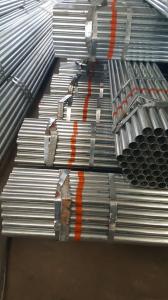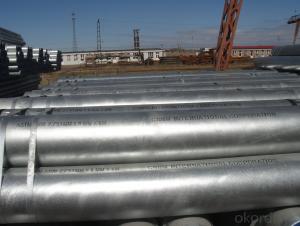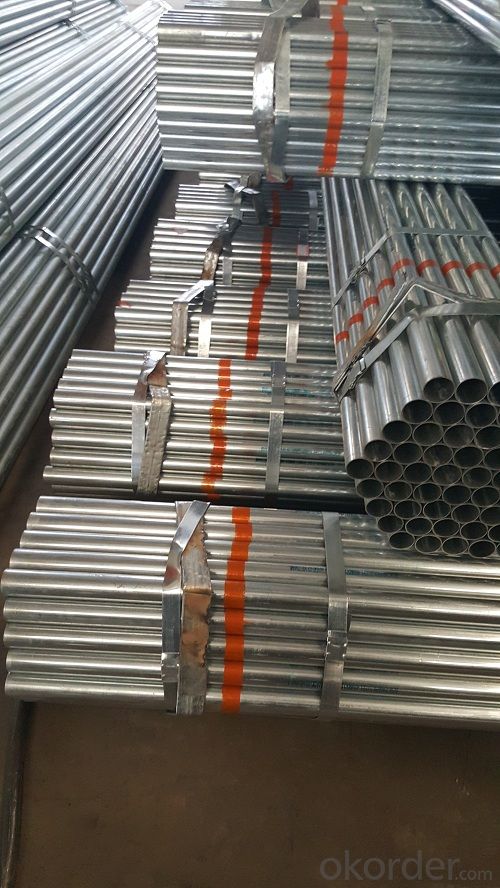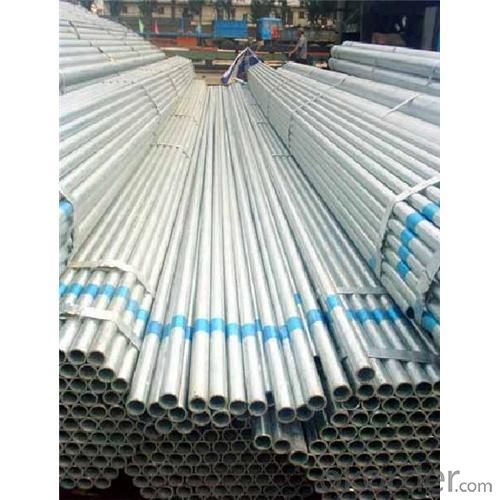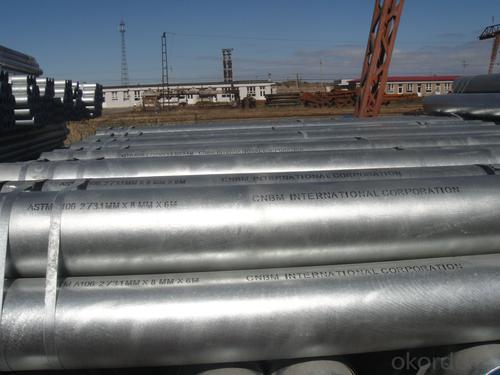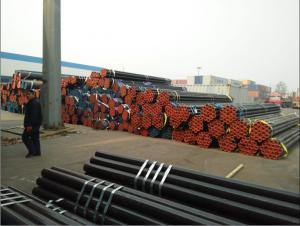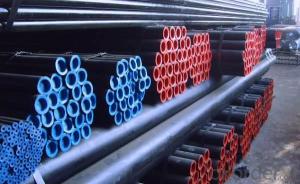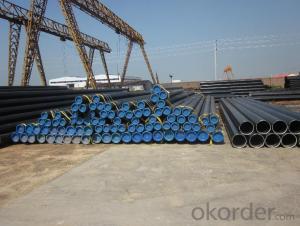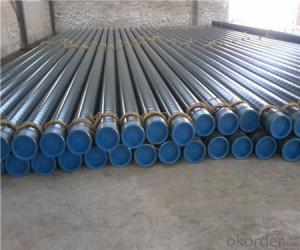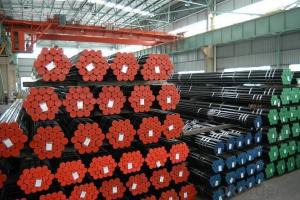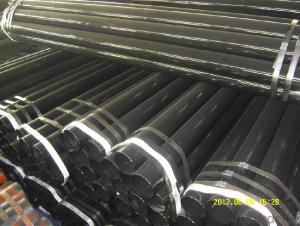GI pipe price 5/8", 3/4", 1",1 1/2"-20" sch40 GI pipe, Q235, Q195, A36, S235, St37
- Loading Port:
- Tianjin
- Payment Terms:
- TT or LC
- Min Order Qty:
- 25 m.t.
- Supply Capability:
- 10000 m.t./month
OKorder Service Pledge
OKorder Financial Service
You Might Also Like
1、Structure of GI pipe price 5/8", 3/4", 1",1 1/2"-20" sch40 GI pipe, Q235, Q195, A36, S235, St37:
The surface of galvanized steel pipe welded steel pipe of hot dip galvanized layer or. Galvanized can increase the corrosion resistance of the steel tube, prolong service life. Galvanized pipe is widely used, in addition to water, gas, oil and other general low pressure fluid pipelines. It is also used in the petroleum industry, especially for offshore oil field of oil well pipe and oil pipe, chemical, coking equipment of oil heater, condensation cooler, coal run oil exchanger tube, and trestle pile, the mine tunnel support frame tube.
.
2、Main Features of GI pipe price 5/8", 3/4", 1",1 1/2"-20" sch40 GI pipe, Q235, Q195, A36, S235, St37:
• High manufacturing accuracy
• High strength
• Small inertia resistance
• Strong heat dissipation ability
• Good visual effect
• Reasonable price
3、GI pipe price 5/8", 3/4", 1",1 1/2"-20" sch40 GI pipe, Q235, Q195, A36, S235, St37Specification:
Standard | GB, DIN, ASTM ASTM A106-2006, ASTM A53-2007 |
Grade | 10#-45#, 16Mn 10#, 20#, 45#, 16Mn |
Thickness | 8 - 33 mm |
Section Shape | Round |
Outer Diameter | 133 - 219 mm |
Place of Origin | Shandong, China (Mainland) |
Secondary Or Not | Non-secondary |
Application | Hydraulic Pipe |
Technique | Cold Drawn |
Certification | API |
Surface Treatment | factory state or painted black |
Special Pipe | API Pipe |
Alloy Or Not | Non-alloy |
Length | 5-12M |
Outer Diameter | 21.3-610mm |
Grade | 20#, 45#, Q345, API J55, API K55, API L80, API N80, API P110, A53B |
Standard | ASME, ASTM |
1) Material:20#(ASTM A 106/A53 GRB.API5LGRB,GB),45#,16Mn,10#.
2) Specification range:OD:21.3-610mm,WT:6-70mm,length:6-12m or according to the requirement of clients.
3) Excutive standards:GB,ASME API5L.ASTM A 106/A53,Despite of the above standards,we can also supply seamless steel pipe with standard of DIN,JIS,and so on,and also develop new products according to the requirements of our clients!
4) Surface:black lacquered,varnish coating or galvanized.
5) Ends:Beveled or square cut,plastic capped,painted.
6) Packing:bundles wrapped with strong steel strip,seaworthy packing.
4、Packaging & Delivery
Packaging Details: | seaworthy package,bundles wrapped with strong steel strip |
Delivery Detail: | 15-30days after received 30%TT |
5、FAQ of GI pipe price 5/8", 3/4", 1",1 1/2"-20" sch40 GI pipe, Q235, Q195, A36, S235, St37:
①How is the quality of your products?
Our products are manufactured strictly according to national and internaional standard, and we take a test
on every pipe before delivered out. If you want see our quality certifications and all kinds of testing report, please just ask us for it.
Guaranteed: If products’ quality don’t accord to discription as we give or the promise before you place order, we promise 100% refund.
②How about price?
Yes, we are factory and be able to give you lowest price below market one, and we have a policy that “ for saving time and absolutely honest business attitude, we quote as lowest as possible for any customer, and discount can be given according to quantity”,if you like bargain and factory price is not low enough as you think, just don’t waste your time.Please trust the quotation we would give you, it is professional one.
③Why should you chose us?
Chose happens because of quality, then price, We can give you both.Additionally, we can also offer professional products inquiry, products knowledge train(for agents), smooth goods delivery, exellent customer solution proposals.Our service formula: good quality+good price+good service=customer’s trust
SGS test is available, customer inspection before shipping is welcome, third party inspection is no problem.
6、GI pipe price 5/8", 3/4", 1",1 1/2"-20" sch40 GI pipe, Q235, Q195, A36, S235, St37 Images:
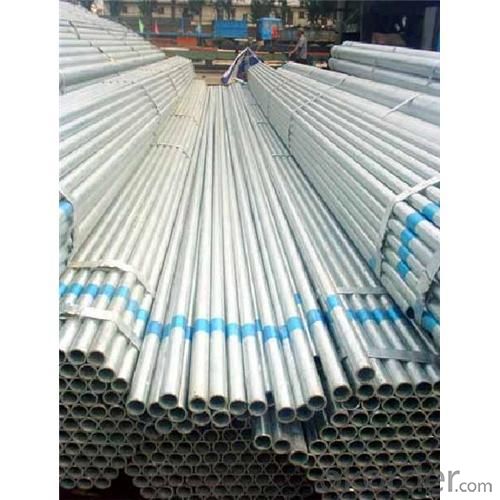
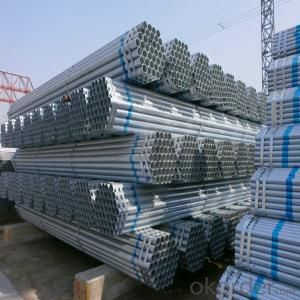
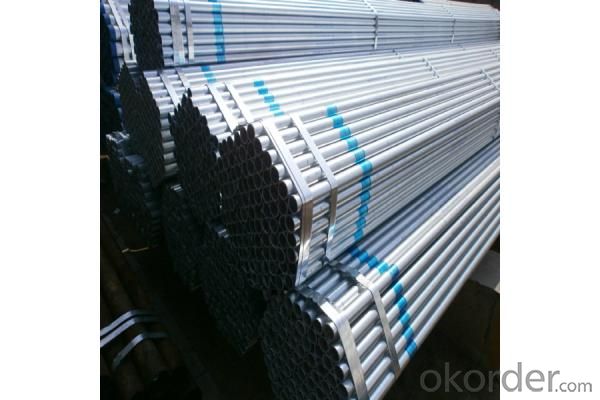
- Q: Can steel pipes be used for cooling systems?
- Yes, steel pipes can be used for cooling systems. Steel pipes are commonly used in various industrial cooling applications due to their durability, high strength, resistance to corrosion, and ability to withstand high pressure and temperature conditions.
- Q: How are steel pipes coated for protection against external elements?
- Steel pipes are coated for protection against external elements through a process called pipeline coating. This involves applying a layer of protective material, such as epoxy or polyethylene, onto the surface of the steel pipes. The coating acts as a barrier, preventing corrosion and damage from external factors like moisture, chemicals, and UV radiation. This protective coating ensures the longevity and durability of the steel pipes, even in harsh environments.
- Q: How are steel pipes used in the manufacturing of offshore wind turbines?
- Steel pipes are used in the manufacturing of offshore wind turbines for various purposes such as supporting the turbine structure, housing electrical cables, and transporting fluids like hydraulic oil and cooling water. These pipes provide structural strength, corrosion resistance, and durability, ensuring the stability and functionality of the turbines in the harsh offshore environment.
- Q: How are steel pipes used in the automotive exhaust systems?
- Steel pipes are commonly used in automotive exhaust systems because steel is a durable and heat-resistant material. Steel pipes are used to transport the exhaust gases from the engine to the muffler and tailpipe, ensuring that the gases are safely and efficiently expelled from the vehicle. These pipes are designed to withstand high temperatures, corrosion, and vibration, making them an essential component in the exhaust system.
- Q: How are steel pipes used in the construction of bridges?
- Steel pipes are commonly used in the construction of bridges as they provide structural support and stability. These pipes are used for various purposes, such as creating the framework, piling, and supporting the bridge's weight. Additionally, steel pipes are often used in the construction of bridge piers and abutments, as well as for drainage systems and utility tunnels. Their high strength and durability make steel pipes essential components in ensuring the safety and longevity of bridge structures.
- Q: How are steel pipes used in the telecommunications infrastructure?
- Steel pipes are used in the telecommunications infrastructure primarily for underground cable installation. They serve as protective conduits that house and secure the fiber optic cables, providing a reliable and durable solution for long-distance communication.
- Q: What is the difference between steel pipes and FRP pipes?
- Steel pipes and FRP (Fiberglass Reinforced Plastic) pipes differ in their material composition, properties, and applications. While steel pipes are made from steel, FRP pipes are composed of a combination of resin and fiberglass. Steel pipes are known for their high strength and durability, making them suitable for heavy-duty applications such as transporting oil, gas, and water. On the other hand, FRP pipes are lightweight, corrosion-resistant, and have excellent chemical resistance, making them ideal for applications where corrosion is a concern, such as in the chemical industry or in sewage systems. Furthermore, FRP pipes offer better insulation properties and are easier to install due to their lighter weight. Overall, the choice between steel pipes and FRP pipes depends on the specific requirements and conditions of the application.
- Q: What is the maximum pressure that steel pipes can withstand?
- The maximum pressure that steel pipes can withstand depends on various factors such as the grade and thickness of the steel, the diameter and length of the pipe, and the specific application. However, steel pipes are known for their high strength and durability, allowing them to withstand significant pressures ranging from several hundred to several thousand pounds per square inch (psi).
- Q: Can steel pipes be used for conveying solid materials?
- Yes, steel pipes can be used for conveying solid materials. Steel pipes are commonly used in industries such as construction, oil and gas, and mining to transport solid materials such as ores, coal, grains, and various other solid substances. The durability and strength of steel make it suitable for handling the weight and pressure of solid materials during transportation.
- Q: What is the difference between hot-finished and cold-finished steel pipes?
- Distinguishing hot-finished and cold-finished steel pipes can be done by examining their manufacturing processes, which lead to different characteristics and applications. To create hot-finished steel pipes, a solid steel billet is heated to a high temperature and then pierced to form a hollow tube. This process, known as hot rolling, ensures that the steel is easily shaped and malleable. As a result, hot-finished steel pipes have rough surfaces and rounded edges. They are generally larger in diameter and have thicker walls. These pipes are commonly utilized in industries that demand high strength and pressure resistance, like the oil and gas sector, structural projects, and heavy machinery manufacturing. On the other hand, cold-finished steel pipes are produced using a process called cold drawing. This involves pulling the hot-finished steel pipe through a die at room temperature to reduce its diameter and achieve the desired shape. The cold drawing process yields a more precise and smoother finish for the steel pipes. Cold-finished steel pipes possess smoother surfaces and sharper edges compared to their hot-finished counterparts. They are typically smaller in diameter and have thinner walls. Cold-finished steel pipes are commonly applied in industries that require accurate dimensions, such as automotive part manufacturing, construction component fabrication, and machinery production. In conclusion, the primary disparity between hot-finished and cold-finished steel pipes stems from their manufacturing processes, resulting in variations in surface finish, dimensions, and applications. Hot-finished pipes are suitable for applications that demand high strength and pressure resistance, while cold-finished pipes are ideal for applications that require precise dimensions and smooth surfaces.
Send your message to us
GI pipe price 5/8", 3/4", 1",1 1/2"-20" sch40 GI pipe, Q235, Q195, A36, S235, St37
- Loading Port:
- Tianjin
- Payment Terms:
- TT or LC
- Min Order Qty:
- 25 m.t.
- Supply Capability:
- 10000 m.t./month
OKorder Service Pledge
OKorder Financial Service
Similar products
Hot products
Hot Searches
Related keywords
